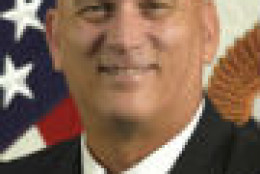On DoD
-
Sometimes you have a plan but contingencies come up and force you to change. That's the situation the Army finds itself in. The service is taking a close look at how budget constraints and blossoming global conflicts are forcing it to adjust. Army Lt. Gen. Michael Williamson is military deputy to the Assistant Secretary of the Army for Acquisition, Logistics and Technology and director of Acquisition Career Management. He spoke with Emily Kopp at the Association of the U.S. Army Expo.
October 14, 2014 -
Only a few weeks ago, Army leadership was planning to shrink its force to levels unseen since before World War II. But that was before Islamic State terrorists threatened to take over Iraq and Syria, before Russia invaded Ukraine and before the U.S. began deploying 4,000 troops to West Africa to help control the Ebola outbreak. Now the Army's Chief of Staff, Gen. Ray Odierno, suggests the Army and political leaders need to rethink their plans. He spoke with Emily Kopp at the Association of the Army Expo about the Army's next steps.
October 14, 2014 -
As part of a project dubbed Command Post 2025, the Army wants to begin running complex modeling and simulation programs on the battlefield, using low-power devices in austere conditions.
October 10, 2014 -
President Richard Nixon once joked with Israeli prime minister Golda Meir. He said he'd give her three U.S. generals in exchange for the legendary Moshe Dyan. Meir answered, sure, I'll take General Motors, General Electric and General Dynamics. Today's Defense Industrial Base is operating in a changing and uncertain economy. In the last few years, it's been hit by Defense spending cutbacks. Nayantara Hensel, former chief economist for the Navy, joined Tom Temin on the Federal Drive to describes what this means to the Defense Industrial Base and to the Defense enterprise.
October 09, 2014 -
Janet Hill, principal at Hill Family Advisors, sits down with the Women of Washington radio show to discuss the importance of diversity in American corporations and her famous Wellesley classmate - Hillary Clinton.
October 08, 2014 -
Jerry Punderson, the outgoing director of contracts for the Naval Sea Systems Command, will join PSC as its new senior vice president of defense and intelligence.
October 06, 2014 -
Navy ship crews encounter a reoccurring problem with something as routine as maintenance requests. It takes 89 administrative steps to turn a request into actual work. Ordinary tasks like laying a non-skid surface on a weather deck get bogged down in paperwork. Now, there is a plan to fix that. Rear Adm. Bill Galinis, Commander of the Navy Regional Maintenance Centers, spoke with Tom Temin on the Federal Drive about the Navy's plans to improve the process.
October 03, 2014 -
The Department of Defense expects a longer and possibly a more costly withdrawal of Army and Marine Corps equipment from Afghanistan than in Iraq, according to a Government Accountability Office report released on Tuesday.
October 02, 2014 -
The Army is the latest federal organization to lay out a career path for its cybersecurity leaders. Career Field 17 will offer soldiers that career path. Advocates of professionalizing the cyber workforce believe that would feed talent pipelines with the people agencies need to succeed. Lt. Col. Sean Kern is cyberspace operations officer, and a graduate student at the Joint Advanced Warfighting School at Joint Forces Staff College at the National Defense University. On In Depth with Francis Rose, he said the main cyber problem right now is a people problem.
October 01, 2014 -
NASA has chosen two contractors to build new capsules and ferry astronauts to the International Space Station. The larger of the two awards, $4.2 billion, went to Boeing. The first launch is scheduled for 2017. Chris Ferguson is the director of Crew and Mission Systems for Boeing's Commercial Crew program. He joined Tom Temin on the Federal Drive with details on the contract and the next steps for the project.
October 01, 2014 -
The Army's Intelligence and National Security Command made awards to 21 firms under an indefinite-delivery contract called Global Intelligence Support Services. This story is part of Jared Serbu's Inside the DoD Reporter's Notebook.
September 29, 2014 -
The leader of the Army's new Cyber Center of Excellence says his job is not merely to build the cyber workforce, but to integrate that up-and-coming capability with the Army's existing signals and intelligence disciplines.
September 26, 2014 -
While deployed in Afghanistan, Christopher Ciampa allegedly stole more than one million gallons of fuel for resale on Afghanistan's black market.
September 26, 2014 -
Cyber operations is about the only area of the DoD budget that hasn't been subject to cuts. But the new leader of the Army's Cyber Center of Excellence says that doesn't mean the Army can grow its newest military discipline in isolation. Federal News Radio DoD reporter Jared Serbu has the details.
September 25, 2014 -
The Army needs big solutions if it wants to generate as much energy as it consumes by 2020. It's using the Fort Carson Army base in Colorado Springs as a testing ground for the Net-Zero Energy Initiative. The General Services Administration identifies four ideas that could help Fort Carson reach big energy breakthroughs. It's also partnering with the Army and Energy Department to measure Fort Carson's progress so far. Ken Sandler is the sustainability and green building advisor within the Office of Federal High Performance Green Buildings at GSA. He told In Depth with Francis Rose what Fort Carson has done so far.
September 24, 2014










